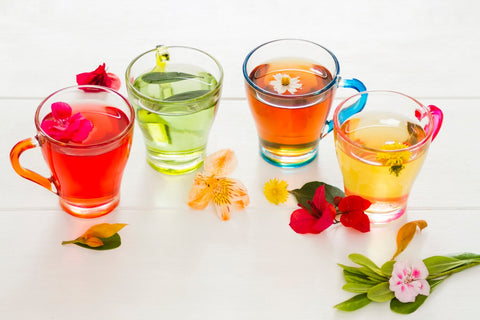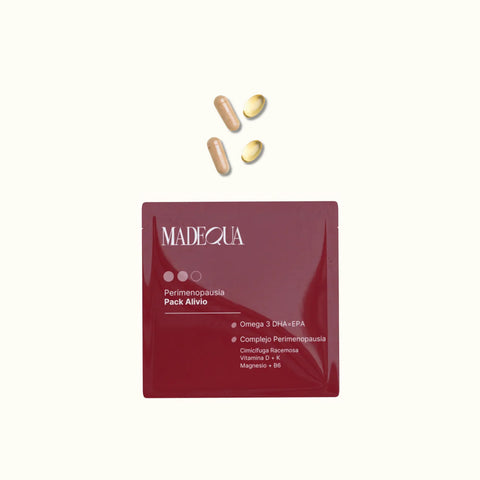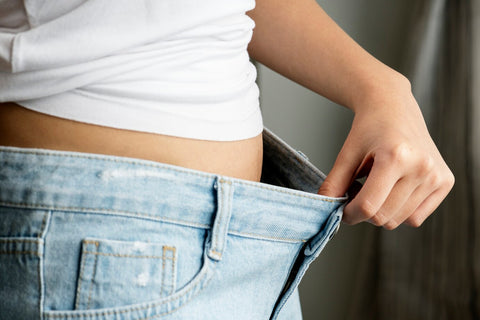Menopause is another stage in a woman's life that takes place after the fertile stage. The menopausal transition is usually a gradual phenomenon that includes different phases ( pre, peri and postmenopause ). Each phase involves specific endocrine and biological changes that give rise to clinical manifestations in the woman's body that are different depending on the moment of menopause in which she finds herself. That is why, support during the menopause stage must understand the uniqueness of each woman depending on the phase she is going through . If you want to know what stage of menopause you are in, you can take our test .
The loss of ovarian function during menopause means that the ovaries stop releasing eggs and producing female hormones such as estrogen . This is why, with the onset of menopause, estrogen levels begin to decrease and, as these hormones regulate different functions in a woman's body, this results in the characteristic symptoms of menopause.
This transition can bring symptoms ranging from hot flashes , difficulty sleeping and mood swings to vaginal dryness , weight gain and increased risk of osteoporosis .
For this stage, it is important to have the care of your doctor or the help of an expert, but there are also ways to alleviate these symptoms and help you go through this new stage with better health and quality of life. From Menopausal Hormonal Therapy to more natural options such as stage-specific Madequa supplements .
To which we can add some natural infusions that we will discuss below that can also be a healthy and effective option.
If you like infusions but feel faint just thinking about drinking something hot under the summer sun, you have to explore the possibilities of a more refreshing version. With ice, aromatic herbs and some sweetener - if necessary, preferably a natural one like honey or coconut sugar rather than white sugar - you can hydrate yourself and it will also help you with those annoying symptoms.
How do we make our cold infusion?
With the varieties of plants that we propose, and with others that you fancy, we explain the 3 methods that you can use to prepare them.
Fast-fast cold infusion method
You don’t have much time….
- Take half a cup of water and put it in the microwave for 1 minute. (You can also use a kettle or stove)
- You add your herbal preparation and wait 5 minutes.
- You take another cup and add 4 ice cubes.
- You pour the contents and there you have it.
Although we have to tell you that you have “mistreated” the product a little, so the flavors are going to be very marked. If the infusion is bitter, it is going to be VERY bitter. We must also tell you that this type of sudden change causes bitter and acidic flavors to prevail.
Slow cold infusion method
You have a little more time and you want to enjoy a good infusion.
- Take an almost full cup of water and put it in the microwave for 2 minutes. (You can also use a kettle)
- Add the herb mixture and wait 5 minutes.
- Remove them and let them rest for 10 or 15 minutes.
- You add a couple of ice cubes
Now the temperature changes have been milder, so the flavours are more pleasant. They also tend to be sweeter if the plants have that taste.
Mashing method
- For forward-thinking people who prepare a day in advance.
- You take 1 liter of water in a bottle and put 3 herbal preparations of the same type
- Let the bottle of water sit with the herbs for about 6 hours or overnight.
- Remove the herbs and leave the bottle in the refrigerator until it cools.
This is without a doubt the best way to drink a cold infusion . You don't add ice and the plants are macerated in water. This gives very pleasant flavours as long as the plants are of good quality. This is the way we recommend to prepare a cold infusion this summer.
What herbs can help with menopause?
Chamomile (Matricaria recutita) for anxiety
The flowering tops of chamomile are widely consumed throughout the Western world as an infusion, with a history of traditional use as a mild relaxant. In different clinical trials, patients were shown to have significant reductions in anxiety and to aid in better digestion.
Melissa (Melissa officinalis) and passionflower (Passiflora incarnata) for anxiety and sleep
Lemon balm leaves have long been traditionally used as a mild sedative. Available clinical trials, although with a low number of participants, point to the positive effect of lemon balm preparations on anxiety in both adults and children.
Passionflower is a medicinal plant that helps reduce stress and can therefore be useful in the treatment of insomnia, anxiety and depression . As it has relaxing properties, it is often indicated in cases of anxiety and stress or as a sleep aid. During menopause, many women report suffering from insomnia and have difficulty falling asleep. That is why this infusion is presented as the perfect natural aid. Even more so if it is combined with lemon balm leaves, which have calming properties. In addition, lemon balm adds an extra benefit to the combination for sleeping and that is that it collaborates in digestive function.
Hops ( Humulus lupulus ) and Sage (Salvia officinalis) for hot flashes and sweating
Hops contain essential oil, flavonoids and substances that act as plant estrogens. The female flowers and their resin, known as lupulin, are used for medicinal purposes. As a sedative plant, it combats irritability and insomnia. It also relieves pain and migraines. In twelve-week studies carried out on menopausal women, a good efficacy was observed in reducing the number of hot flashes (40-70%) halfway through the treatment period, as well as a significant general improvement in menopausal symptoms such as anxiety, depression, insomnia, fatigue, night sweats and sexual interest, including the reduction of symptoms in early menopause .
During menopause, hot flashes and night sweats are among the most common and unpopular symptoms of this stage. Sage leaves (considered a phytoestrogen, it acts on estrogen receptors) have traditionally been used in the treatment of sweating, and are currently recognized by the EMA ( European Medicines Agency) with this indication within the category of traditional herbal medicine. In addition, sage is a medicinal plant with thermoregulatory properties helping with hot flashes. Sage extract can also help with stress and sleep quality.
Ginger ( Zingiber officinale) and Horsetail ( Equisetum arvense) for fluid retention
If there is an infusion with a diuretic effect par excellence, it is horsetail. With it you can fight against the fluid retention that many women suffer during menopause and that causes them to gain weight. Due to hormonal changes, a woman's body can have difficulty expelling excess fluid. If we add a pinch of grated ginger to a horsetail infusion, we will further enhance the detoxifying effect of the drink and add an anti-inflammatory, antioxidant and analgesic plus.
St. John's Wort (Hypericum perforatum) and Valerian (Valeriana officinalis) to improve your mood
The drop in estrogen levels during menopause upsets the mood of many women. St. John's wort is a medicinal plant with antidepressant properties, but you should not take it (not even as an infusion) without first consulting a doctor, because it sometimes interferes with other medications, creating annoying side effects. It contains hypericin, which is why it is said to have antidepressant properties and to be useful in improving mood in cases of mild depression or temporary states of depression.
St. John's wort can be consumed as an infusion and, in turn, topically thanks to its essential oil. We can take St. John's wort in the form of oil.
Better known is valerian infusion, a natural remedy that has been used for years to combat nervousness and insomnia, and which has far fewer contraindications. Valerian roots are used. This is a medicinal plant traditionally used in the treatment of various central nervous system conditions such as insomnia, anxiety and mild depression.
And remember to consult with a doctor before taking medicinal herbs, it is essential to ensure their safe and effective use. Health professionals can identify possible interactions between herbs and prescribed medications, avoiding adverse effects. In addition, the proper dosage is crucial to obtain the desired benefits without causing harm. Professional guidance ensures that herbs are used in an informed and responsible manner, protecting your health and helping you achieve your well-being.
References
Navarro M.ªC, Losa F, Beltrán E, Ortega M.ªT, Carretero M.ªE, Cañigueral S, Bachiller I, Vila R, Alonso M.ªJ, López-Larramendi JL, Allué J, Martín M, Cornellana M.ªJ , Mendoza N, Castelo-Branco, C. Natural products for mature women , MenoGuía AEEM. First edition 2022.
Lobo RA, Gompel A. Management of menopause: a view towards prevention. Lancet Diabetes Endocrinol . 2022;10(6):457-470. doi: 10.1016/S2213-8587(21)00269-2.
Ruiz, A. Differences between premenopause, perimenopause, menopause and climacteric. Menopause Institute. 2020.
Santoro N. Perimenopause: From Research to Practice. J Womens Health (Larchmt). 2016;25(4):332-9. doi: 10.1089/jwh.2015.5556.
Kennedy DO, Scholey AB, Tildesley NT, Perry EK, Wesnes KA. Modulation of mood and cognitive performance following acute administration of Melissa officinalis (lemon balm). Pharmacol Biochem Behav. 2002;72(4):953-64. doi:10.1016/s0091-3057(02)00777-3
Kennedy DO, Little W, Scholey AB. Attenuation of laboratory-induced stress in humans after acute administration of Melissa officinalis (Lemon Balm). Psychosom Med. 2004 Jul;66(4):607-13. doi: 10.1097/01.psy.0000132877.72833.71.
Amsterdam JD, Shults J, Soeller I, Mao JJ, Rockwell K, Newberg AB. Chamomile (Matricaria recutita) may provide antidepressant activity in anxious, depressed humans: an exploratory study. Altern Ther Health Med. 2012 Sep-Oct;18(5):44-9.
Eatemadnia A, Ansari S, Abedi P, Najar S. The effect of Hypericum perforatum on postmenopausal symptoms and depression: A randomized controlled trial. Complement Ther Med. 2019;45:109-113. doi: 10.1016/j.ctim.2019.05.028.
Janda K, Wojtkowska K, Jakubczyk K, Antoniewicz J, Skonieczna-Żydecka K. Passiflora incarnata in Neuropsychiatric Disorders-A Systematic Review. Nutrients. 2020 Dec 19;12(12):3894. doi:10.3390/nu12123894
Wilfried D, Nina CDG, Silvia B. Effectiveness of Menosan® Salvia officinalis in the treatment of a wide spectrum of menopausal complaints. A double-blind, randomized, placebo-controlled, clinical trial. Heliyon. 2021;7(2):e05910. doi: 10.1016/j.heliyon.2021.e05910.
Aghamiri V, Mirghafourvand M, Mohammad-Alizadeh-Charandabi S, Nazemiyeh H. The effect of Hop (Humulus lupulus L.) on early menopausal symptoms and hot flashes: A randomized placebo-controlled trial. Complement Ther Clin Pract. 2016;23:130-5. doi: 10.1016/j.ctcp.2015.05.001.
Assessment report on Valeriana officinalis L., radix and Valeriana officinalis L., aetheroleum. EMA/HMPC/150846/2015 Committee on Herbal Medicinal Products (HMPC) 2016.
Ziegler G, Ploch M, Miettinen-Baumann A, Collet W. Efficacy and tolerability of valerian extract LI 156 compared with oxazepam in the treatment of non-organic insomnia--a randomized, double-blind, comparative clinical study. Eur J Med Res. 2002;7(11):480-6.
Oxman AD, Flottorp S, Håvelsrud K, Fretheim A, Odgaard-Jensen J, Austvoll-Dahlgren A, Carling C, Pallesen S, Bjorvatn B. A televised, web-based randomized trial of an herbal remedy (valerian) for insomnia. PLoS One. 2007;2(10):e1040. doi: 10.1371/journal.pone.0001040.




Comments (0)
There are no comments for this article. Be the first one to leave a message!